 Vampire Weekend's Surprising Jewish Stories
Vampire Weekend's Surprising Jewish Stories
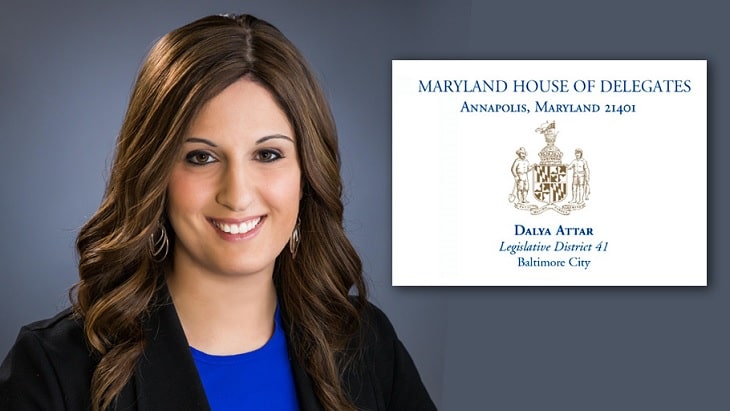

12 min read
The fresh political voice of Dalya Attar. An Aish.com exclusive interview.
Striding through the halls of the Maryland House of Delegates, 29-year-old Dalya Attar is an anomaly: the highest-ranking elected Shabbat-observant female in U.S. history.
As a candidate last year in Baltimore’s District 41 – 65% African-American, and 5% Jewish – Dalya defeated 12 other candidates, including the incumbent. She now spends 90 days each winter in Annapolis, bringing her deeply-engrained Jewish values to the machinations of legislative politics.
Dalya is also a devoted wife and mother. On the day of our conversation, she texts with a request to push back our meeting by 30 minutes. Snow was falling in Baltimore and, with a delayed school start, she needed to drive her young children to school.
It is this reality of motherhood colliding with career – and the Jewish values that underpin her life – that makes Dalya Attar a refreshing voice of balance and sanity in today’s often-turbulent political waters.
Dalya’s conversation with Aish.com has been edited for clarity.
Aish.com: People say that you bring a fresh voice and perspective to the world of politics.
Dalya Attar: I am new to politics, not from a political family, and not part of a political machine. I want to do what's right. If I see something that should be done, I tell people how it is. As a prosecutor, I’m used to standing up and speaking out. I won't beat around the bush just to please people.
Aish.com: When it comes to straight-talk, politicians don’t always have the best reputation.
“’Don't lie, cheat or steal’ has always been basic in my book.”
Dalya: There is a perception that corruption is part of the political game, and there are many examples where that’s true. Unfortunately in recent years, many Marylanders in positions of authority have faced serious ethical violations or abused power – including the prior state senator in my district who is currently sitting in jail.
Aish.com: How has your Jewish upbringing influenced how you navigate the political swamp?
Dalya: Growing up in my family and attending Bais Yaakov (network of Jewish schools), morals and ethics always came first. “Don't lie, cheat or steal” has always been basic in my book. I will not deviate from these beliefs. If I have a doubt whether something is right or wrong, I tell myself the answer is “no.” When it comes to integrity, I err on the safe side.
I look at my religion and my beliefs, not as something that hinders my career and desire to help people, but enhances that ability. Jewish values are a huge asset in politics, guiding me and making it so much easier to represent the people. I train prosecutors and tell them, “Don’t ever lie about a case. It's not the right thing to do, and nothing is worth taking a chance on your reputation.”
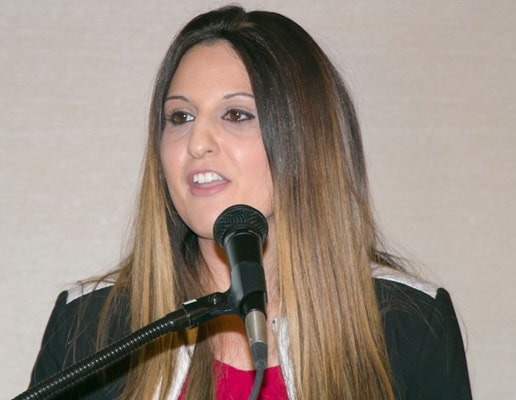
Aish.com: Take us back to the beginning. What is your family background?
Dalya: My father came to the U.S. from Iran in search of a better future. My mother did the same coming from Morocco. They wanted to raise a family in a democracy, with freedom of religion and better economic opportunities. They met in Baltimore and – despite a new language, culture, and lifestyle – they worked hard, overcame many obstacles, and raised a family of six children.
Aish.com: What sparked your interest in politics?
Dalya: As a teenager, I’d pay close attention to the news. If there was a problem in the city or in the world, I passionately wanted to do something about it. I’ve always been an independent thinker, unwilling to accept the status quo. I wanted to be a lawyer, but knew it would tend in the direction of politics.
Aish.com: You speak about wanting to put the “more” back in Baltimore. Why?
Dalya: I've spent my entire life in Baltimore. I studied criminal justice at the University of Baltimore, and earned my law degree at the University of Maryland. When I graduated law school in 2014, I became a prosecutor in Baltimore State’s Attorney.
My parents live two blocks from my house. I work for the city, and I’m a wife and mother raising my family here. I’ve had a front row seat to the best of Baltimore, but also to the challenges we face. The desire to give back to my community motivated my decision to run for office.
Aish.com: Tell us about the moment you decided to run.
“An 11-year-old boy was pleading with me to help him. As a mother of two young kids, I was in tears. ”
Dalya: In 2016, I was working as a prosecutor in a juvenile detention center in Baltimore. I was coming to work every day, in the courtroom with these kids. An 11-year-old boy was pleading with me to help him, to not send him away. As a mother of two young kids, I was in tears.
Around this time I was approached by members of the Jewish community in Baltimore to run for office. I realized that as a prosecutor, there are limits to the impact I can make. A lot happens at the legislative level. So I decided to run.
Aish.com: You are the first Orthodox Jew elected to the Maryland legislature. What inspired you to break that barrier?
Dalya: I have a bold personality. I learned to think for myself and believe in my abilities. I'm not afraid to take chances. Otherwise I never would have run for office.
Initially, people were skeptical if I could win such a competitive race. I had no political connections. So I campaigned in all 50 communities in the district. My husband, siblings, friends and members of the community were out there every day, putting up signs and helping to organize. It was a true grassroots campaign.
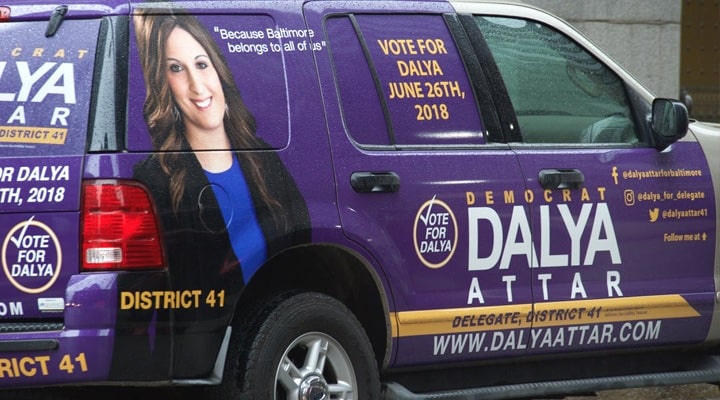
Aish.com: What are the ways you help the 5% of your district that is Jewish?
Dalya: For many years the Jewish community felt that we had inadequate representation. Time and again, we saw legislators voting for an agenda that doesn’t meet the needs of our community.
On one hand, I’m a passionate advocate for improving public schools. On the other hand, as an alumnus of Bais Yaakov, I see the need for publicly-funded scholarships for private schools. Tuition creates huge financial pressures, which may mean it’s not possible for every child to attend Jewish school and receive those values that are so important to our Jewish community.
Aish.com: How do you juggle professional and personal responsibilities?
Dalya: In 2012, at age 21, I married my brothers’ friend, and we had two children while I pursued my law degree. It’s always been about juggling my family and career, and I’m blessed to have a supportive family. It's about balance and priorities. If there's a school event for my kids, I'll go there instead of to a professional event.
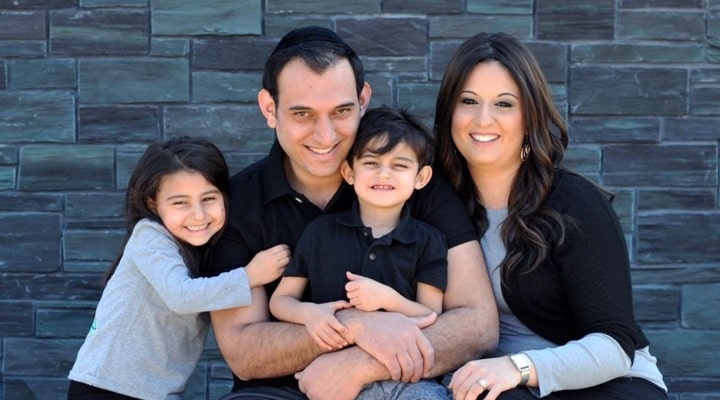
Aish.com: Any instances where the practicalities of Jewish observance affect your career?
Dalya: During the campaign there were many events that I would not attend on Shabbos. So I reframed the situation as a healthy break from the rigors of an election campaign. After I won the election, I saw my Jewish beliefs taking me to where I want to be. I won’t ever turn away from them.
Sometimes I get home right before Shabbos starts – but I get home on time, every time. During my first legislative session in 2019, I was required to attend one Saturday session. After consultation with a rabbi, I spent the entire Shabbat at the capital, and attended the session with no devices and no active participation.
Aish.com: Did any Jewish individual inspire you to enter politics?
Dalya: Growing up, I’d frequently visit an aunt and uncle in Connecticut who attend the same shul as Senator Joe Lieberman. As a 10-year-old, seeing a Shabbat-observant Jew run for vice-president seemed normal to me.
As a 10-year-old, seeing a Shabbat-observant Jew run for vice-president seemed normal to me.
Later, as a prosecutor, I was several times in the courtroom of Karen (Chaya) Friedman, an Orthodox judge on Baltimore’s 8th Judicial Circuit. Also, a year prior to my campaign, Isaac Yitzy Schleifer became the first Orthodox city councilman elected in Baltimore. Like me, he was in his 20s, and that inspired me to the possibilities.
Aish.com: Which historical figure do you view as a role model?
Dalya: Sarah Schenirer, the founder of Bais Yaakov a century ago in Poland, was someone who stepped out of the box and did something very great to help our community. She is a model of how to successfully balance Jewish tradition while pushing for innovation and creativity.
Her story also demonstrates that change happens on the ground. One woman, with little fanfare, simply did what needed to be done. She didn’t wait for big organizations to get involved, or let herself get mired in politics. She started her school, its success spoke for itself, and the organized community followed suit. In this respect, Bais Yaakov is a model grassroots movement.
Aish.com: It’s interesting that you say this. Rabbi Noah Weinberg zt"l, the founder of Aish HaTorah, also drew deep inspiration from Sarah Schenirer, often saying that she influenced the Jewish people more than any other person in the 20th century. (Rabbi Weinberg’s sister, Chavah Pincus, was sent to
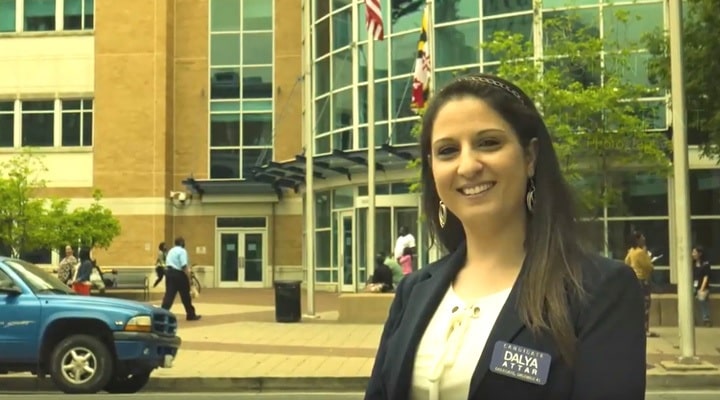
Aish.com: Baltimore is known as one of the crime capitals of America. Tell us about the opioid epidemic, which is a full-blown crisis in your city.
Dalya: The opioid epidemic is a non-partisan issue; it does not discriminate. My friend in school died from this and I have personally seen the effects this epidemic has on families. Drugs are almost as easy to buy as bread and milk. But we aren’t going to get anywhere with fears and complaints. We need action. When I became a prosecutor, I joined the narcotics unit – prosecuting drug dealers, reducing the amount of drugs on the street, and arranging treatment for drug users.
Aish.com: Have you carried this fight against drugs into the legislative chamber?
Dalya: I was appointed to Maryland ’s House Opioid Workgroup. We worked to pass legislation regarding lawsuits against opioid manufacturers – mandating that money received be placed into a dedicated fund for drug treatment and recovery programs. I also partnered with Chayeinu, a Baltimore organization working to prevent addictions. We train local school administrators in the use of NARCAN, the nasal spray that counteracts the life-threatening effects of an opioid overdose.
Aish.com: How are your relations with the 65% of your constituency that is African-American?
“Some people don’t like me because I’m Jewish, and others are even blatantly anti-Semitic. ”
Dalya: Some people don’t like me because I’m Jewish, and others are even blatantly anti-Semitic. Yet many of my African-American constituents are very supportive. I have a very good relationship with all communities in my district, and fortunately the majority of my district and I do not judge each other based on race or religion.
Also, we’re fortunate in Baltimore to have as a role model the recently-deceased U.S. Rep. Elijah Cummings. His Youth Program brings elite African-American high school students to Israel, as a way to further bonds between those communities.
During Black History Month, I co-sponsored Hate Crimes legislation to include “the attempt or threat of committing a hate crime,” as one way to help to reduce rampant violence in Baltimore. I aspire to be like Elijah Cummings in standing up for human rights, and making clear that hate is never allowed.
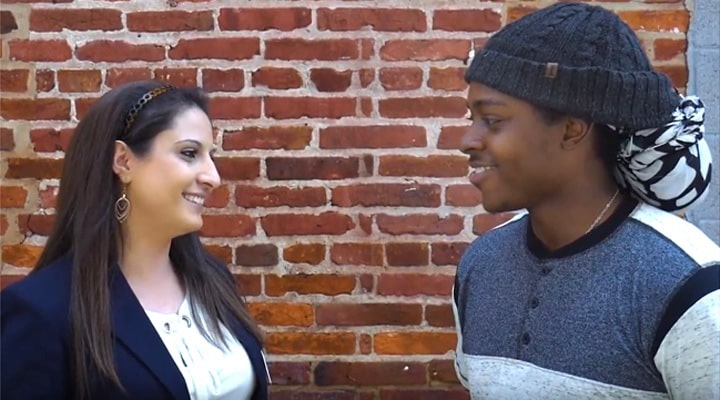
Aish.com: Maryland is a heavily Democratic state. In 2016, Hillary Clinton won Maryland with over 60% of the vote, and the Maryland House of Delegates is 70% Democrat. Given the reality of partisan politics, are you pressured to vote the party line?
Dalya: My parents were Democrats, and I’m a Democrat. But I will break from the Democratic line when it contradicts my beliefs. For example, I voted against the party line on the “end-of-life bill,” granting people the right to suicide. The bill left too much room for abuse, too much room for the disabled communities and minority communities to be harmed by it. Just because I have a “D” for Democrat doesn't dictate who I am or what I believe in.
Aish.com: Your term in the Maryland House of Delegates is four years, and in January 2020 you’ll be starting a 90-day session. Will you be introducing any new legislation?
Dalya: Yes, one that addresses the issue of Jewish marriage and divorce. New York and a few other states have passed a law stating that civil divorce is contingent on “nothing else impeding a full divorce.” This prevents someone from enjoying the benefits of civil divorce, while still complicating their ex-spouse’s life from a Jewish perspective. In consultation with a rabbi, I’m sponsoring similar legislation during the coming session.
Aish.com: I imagine you have higher political aspirations.
Dalya: I’m inspired by the example of Ben Cardin, who started out in the Maryland House of Delegates and is now a popular U.S. Senator. He is very pro-Israel, and vocally against anti-Semitism. I respect that.
Visit Dalya's website at www.dalyaattar.com
